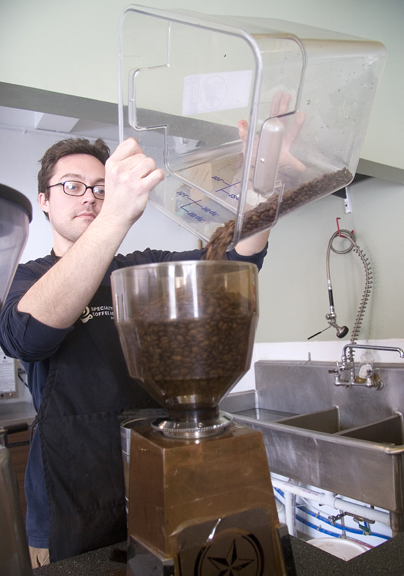2007.02.16: February 16, 2007: Headlines: COS - Honduras: Coffee: Organic Food: Small Business: Fair Trade: Daily Nebraskan: Honduras RPCV Jon Ferguson owns Cultiva where he sells organically grown, fair-trade coffee
Peace Corps Online:
Directory:
Honduras:
Peace Corps Honduras:
Peace Corps Honduras: Newest Stories:
2007.02.16: February 16, 2007: Headlines: COS - Honduras: Coffee: Organic Food: Small Business: Fair Trade: Daily Nebraskan: Honduras RPCV Jon Ferguson owns Cultiva where he sells organically grown, fair-trade coffee
Honduras RPCV Jon Ferguson owns Cultiva where he sells organically grown, fair-trade coffee

I was a Hillside Farming Agricultural Extensionist Peace Corps Volunteer in Northwestern Honduras in 2000,” Ferguson said. “I took three months of extensive language and technical training, mostly related to soil conservation and organic farming.” The group worked a little with coffee production and visited a few farms, he said. After the Peace Corps, Ferguson relocated to Seattle and found a job with Zoka Coffee and Tea Co., famous for training its baristas for competition. After returning to Lincoln, Ferguson tried his hand selling records, but he got sick of haggling with buyers and sellers. “I always felt that I wasn’t going the right direction in my life,” he said. “I kept on thinking about my experiences in the Peace Corps … and decided that I should get into coffee.”
Honduras RPCV Jon Ferguson owns Cultiva where he sells organically grown, fair-trade coffee
Cultiva Coffee offers art atop every latte
By: Robby DeFrain
Issue date: 2/16/07 Section: Arts & Entertainment
Caption: Jon Ferguson, owner of Cultiva Coffee, grinds up espresso beans to create a new espresso blend. Ferguson tries to keep a large selection of coffee flavors available to customers.
Media Credit: Vanessa Skocz
Jim Glenn-Hash, second-grade teacher at Lincoln’s Saratoga Elementary School stands inside Cultiva Coffee, waiting for a hot drink on a very cold day.
“I started coming three to four weeks ago,” Glenn-Hash says. “I can’t afford to get a latte every day, but I do it once, maybe twice a week.”
Jon Ferguson, owner of Cultiva, 1501 South St., quickly prepares the double latte with whole milk.
The phone rings.
“Lattes are much more important than a phone call,” Ferguson says without blinking an eye.
Spend ten minutes talking with Ferguson, and you'll find he values coffee above a lot of things.
This is Ferguson’s first foray into the coffee business, although he’s always viewed coffee as “something more than a beverage.”
“I was a Hillside Farming Agricultural Extensionist Peace Corps Volunteer in Northwestern Honduras in 2000,” Ferguson said. “I took three months of extensive language and technical training, mostly related to soil conservation and organic farming.”
The group worked a little with coffee production and visited a few farms, he said.
After the Peace Corps, Ferguson relocated to Seattle and found a job with Zoka
Coffee and Tea Co., famous for training its baristas for competition.
After returning to Lincoln, Ferguson tried his hand selling records, but he got sick of haggling with buyers and sellers.
“I always felt that I wasn’t going the right direction in my life,” he said. “I kept on thinking about my experiences in the Peace Corps … and decided that I should get into coffee.”
Coffee is the second largest commodity traded in the world, just after oil, and it uses more pesticides in its production than any other agricultural product.
“Most everything I have is organically grown, fair-trade coffee,” Ferguson said.
Ferguson opened Cultiva Coffee, which he describes as a micro-roastery, on Dec. 20 of last year.
“I wanted to help improve the lives of marginalized peoples in coffee producing countries, aka the third world,” Ferguson said.
Café Imports, where Ferguson buys his beans, sells direct relationship coffee, meaning the people who buy the coffee have direct dealings with the people who grow the coffee, as opposed to buying beans from a coffee broker, which is basically commodity coffee.
Ferguson buys his beans raw and roasts them right in his shop.
It takes him about 13.5 minutes on average to roast a five-pound batch.
“I can’t do more than five pounds at a time,” he said, explaining that he looks at the roaster “every 15 seconds” to make sure the temperature is right.
“Each bean is different, and each batch size causes each bean to be roasted differently,” Ferguson said. “The more you roast, the better you learn how to handle certain beans.”
For example, he said, really small beans, like a Yemen, crack at lower temperatures than Guatemalan beans, which are larger and denser due to higher moisture content.
Ferguson’s meticulous philosophy on coffee extends well beyond roasting.
“I do latte art,” he said. “The style of drinks that I do is considered to be more of a traditional Italian style. My cappuccino only comes in one size, equal parts espresso, steamed milk and foam.”
Ferguson noted that there are a lot of misconceptions about espresso, which is a mixture of different beans with different flavors. “When you put them together, it encompasses all the good flavors of what coffee has to offer.”
“I try to inform customers of my style without being insulting. I try to define things in a polite way and try to give references to why I do it a certain way, like a macchiato,” Ferguson said. “Anywhere you go, you will get a different style of macchiato.”
And in the end, he said, “It’s all about the coffee.”
Links to Related Topics (Tags):
Headlines: February, 2007; Peace Corps Honduras; Directory of Honduras RPCVs; Messages and Announcements for Honduras RPCVs; Coffee; Organic Food; Small Business; Fair Trade; Nebraska
When this story was posted in March 2007, this was on the front page of PCOL:





Peace Corps Online The Independent News Forum serving Returned Peace Corps Volunteers
 | Chris Dodd's Vision for the Peace Corps
Senator Chris Dodd (RPCV Dominican Republic) spoke at the ceremony for this year's Shriver Award and elaborated on issues he raised at Ron Tschetter's hearings. Dodd plans to introduce legislation that may include: setting aside a portion of Peace Corps' budget as seed money for demonstration projects and third goal activities (after adjusting the annual budget upward to accommodate the added expense), more volunteer input into Peace Corps operations, removing medical, healthcare and tax impediments that discourage older volunteers, providing more transparency in the medical screening and appeals process, a more comprehensive health safety net for recently-returned volunteers, and authorizing volunteers to accept, under certain circumstances, private donations to support their development projects. He plans to circulate draft legislation for review to members of the Peace Corps community and welcomes RPCV comments. |
 | He served with honor
One year ago, Staff Sgt. Robert J. Paul (RPCV Kenya) carried on an ongoing dialog on this website on the military and the peace corps and his role as a member of a Civil Affairs Team in Iraq and Afghanistan. We have just received a report that Sargeant Paul has been killed by a car bomb in Kabul. Words cannot express our feeling of loss for this tremendous injury to the entire RPCV community. Most of us didn't know him personally but we knew him from his words. Our thoughts go out to his family and friends. He was one of ours and he served with honor. |
 | Peace Corps' Screening and Medical Clearance
The purpose of Peace Corps' screening and medical clearance process is to ensure safe accommodation for applicants and minimize undue risk exposure for volunteers to allow PCVS to complete their service without compromising their entry health status. To further these goals, PCOL has obtained a copy of the Peace Corps Screening Guidelines Manual through the Freedom of Information Act (FOIA) and has posted it in the "Peace Corps Library." Applicants and Medical Professionals (especially those who have already served as volunteers) are urged to review the guidelines and leave their comments and suggestions. Then read the story of one RPCV's journey through medical screening and his suggestions for changes to the process. |
 | The Peace Corps is "fashionable" again
The LA Times says that "the Peace Corps is booming again and "It's hard to know exactly what's behind the resurgence." PCOL Comment: Since the founding of the Peace Corps 45 years ago, Americans have answered Kennedy's call: "Ask not what your country can do for you--ask what you can do for your country. My fellow citizens of the world: ask not what America will do for you, but what together we can do for the freedom of man." Over 182,000 have served. Another 200,000 have applied and been unable to serve because of lack of Congressional funding. The Peace Corps has never gone out of fashion. It's Congress that hasn't been keeping pace. |
 | PCOL readership increases 100%
Monthly readership on "Peace Corps Online" has increased in the past twelve months to 350,000 visitors - over eleven thousand every day - a 100% increase since this time last year. Thanks again, RPCVs and Friends of the Peace Corps, for making PCOL your source of information for the Peace Corps community. And thanks for supporting the Peace Corps Library and History of the Peace Corps. Stay tuned, the best is yet to come. |
 | History of the Peace Corps
PCOL is proud to announce that Phase One of the "History of the Peace Corps" is now available online. This installment includes over 5,000 pages of primary source documents from the archives of the Peace Corps including every issue of "Peace Corps News," "Peace Corps Times," "Peace Corps Volunteer," "Action Update," and every annual report of the Peace Corps to Congress since 1961. "Ask Not" is an ongoing project. Read how you can help. |
Read the stories and leave your comments.

Some postings on Peace Corps Online are provided to the individual members of this group without permission of the copyright owner for the non-profit purposes of criticism, comment, education, scholarship, and research under the "Fair Use" provisions of U.S. Government copyright laws and they may not be distributed further without permission of the copyright owner. Peace Corps Online does not vouch for the accuracy of the content of the postings, which is the sole responsibility of the copyright holder.
Story Source: Daily Nebraskan
This story has been posted in the following forums: : Headlines; COS - Honduras; Coffee; Organic Food; Small Business; Fair Trade
PCOL36212
91

















